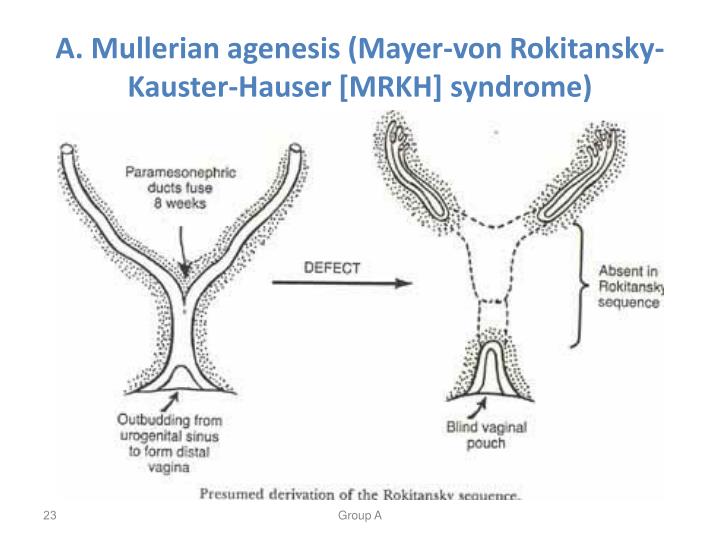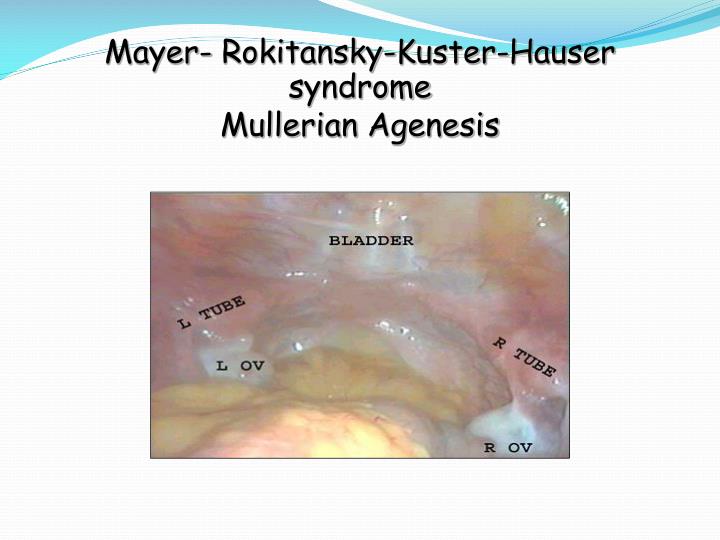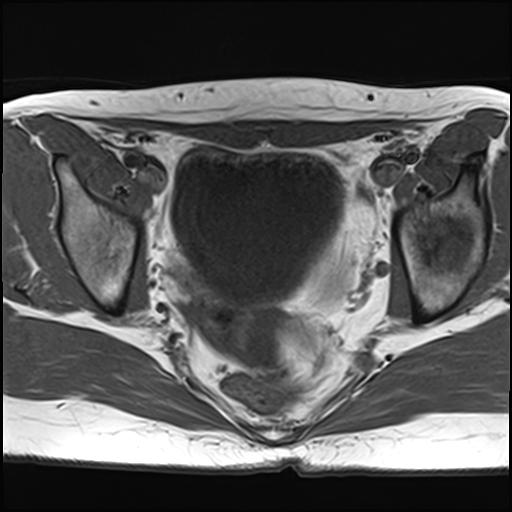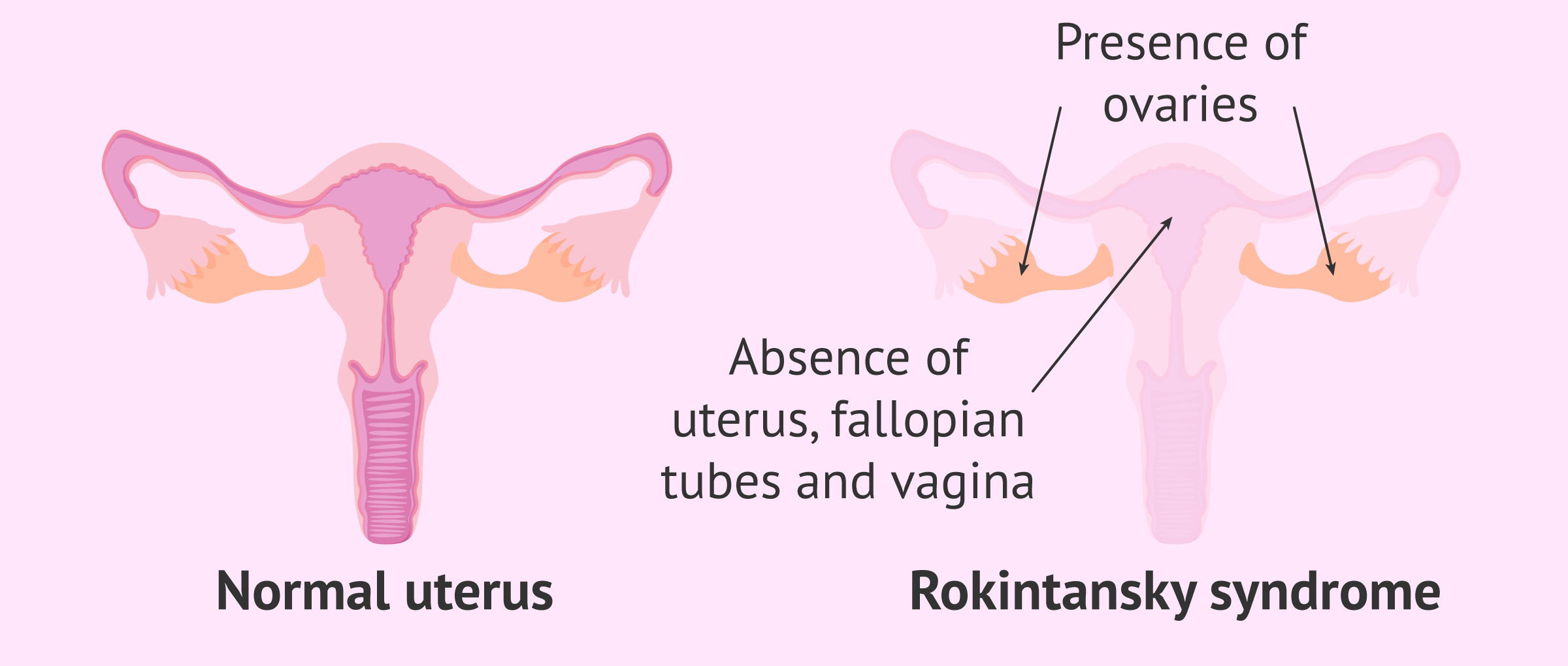MayerRokitanskyKusterHauser Syndrome Diagnosis with MR Imaging Radiology

Mayer-Rokitansky-Küster-Hauser syndrome (MRKH syndrome) is a rare congenital disorder that can affect women and people assigned female at birth (AFAB). It's a condition that causes your vagina and uterus to be missing or underformed. In most cases, your ovaries and fallopian tubes function normally, and your external genitals are unaffected.
42+ Mayer Rokitansky Küster Hauser Syndrom Gif Blognya Cak Lontong

Background. Mayer-Rokitansky-Küster-Hauser (MRKH) syndrome, also referred to as Müllerian aplasia, is a congenital disorder characterized by aplasia of the uterus and upper part of the vagina in females with normal secondary sex characteristics and a normal female karyotype (46,XX).
Representative case of MayerRokitanskyKüsterHauser (MRKH) syndrome in... Download Scientific
In Mayer-Rokitansky-Küster-Hauser syndrome (müllerian agenesis) there is congenital absence of the upper two-thirds of the vagina and the uterus is absent or rudimentary. A common presentation is primary amenorrhoea in a female with 46,XX karyotype and normal secondary sexual characteristics.
Figure 1 from MayerRokitanskyKusterHauser Syndrome Embryology, and Clinical and

Mayer-Rokitansky-Küster-Hauser (MRKH) syndrome is a disorder that mainly affects the female reproductive system. This condition causes the vagina and uterus to be underdeveloped or absent, although external genitalia are normal. Affected individuals usually do not have menstrual periods due to the absence of a uterus.
MayerRokitanskyKüsterHauser syndrome (MRKH) with rudimentary uterine horns Image

What Is Mayer-Rokitansky-Küster-Hauser Syndrome? Mayer-Rokitansky-Küster-Hauser (MRKH) syndrome is a condition that affects the female reproductive system. It may also be called uterine agenesis or Müllerian agenesis. MRKH: Happens when the uterus and vagina of a baby born female may be missing or may not have fully developed.
PPT Disorders of menstrual function. Neuroendocrine syndromes in gynecology PowerPoint

Mayer-Rokitansky-Küster-Hauser (MRKH) syndrome is a rare condition that impacts the female reproductive system. Its characteristic feature is an underdeveloped or absent uterus and vagina, but.
Fertility options in MayerRokitanskyKüsterHauser syndrome

Mayer-Rokitansky-Küster-Hauser (MRKH) syndrome (also referred to as Mayer-Rokitansky syndrome or Rokitansky-Küster-Hauser syndrome) consists of vaginal aplasia with other müllerian (ie, paramesonephric) duct abnormalities. [ 1] Type I MRKH syndrome is characterized by variable underdevelopment of the vagina and uterus.
Sonographic Detection of MayerRokitanskyKüsterHauser Syndrome Bethany C. Rogers, Kelsy L

The Mayer-Rokitansky-Küster-Hauser (MRKH) syndrome is characterized by congenital aplasia of the uterus and the upper part (2/3) of the vagina in women showing normal development of secondary sexual characteristics and a normal 46, XX karyotype. It affects at least 1 out of 4500 women.
MayerRokitanskyKusterHauser (MRKH) Syndrome Type 2 Atypical Presentation of Rare Case

Purpose To evaluate the diverse magnetic resonance (MR) imaging findings of the pelvis in women with Mayer-Rokitansky-Kuster-Hauser (MRKH) syndrome. Materials and Methods This retrospective review had institutional review board approval with waiver of informed consent. Between 2001 and 2011, 215 female patients with MRKH syndrome attended clinics, and 66 underwent pelvic MR imaging (age range.
(PDF) Customised Vaginal Stent The Phases in Management of Vaginal Agenesis in Mayer

Mayer-Rokitansky-Küster-Hauser (MRKH) Syndrome is a congenital condition (meaning present at birth). MRKH occurs in 1 in 5000 females. Typically, MKRH is characterised by the under development or absence of the uterus, cervix and upper portion of the vagina. Due to the absence of the uterus, people with MKRH will typically not experience.
(PDF) MayerRokitanskyKüsterHauser syndrome (MRKH) A fundamental information for the study

The Mayer-Rokitansky-Küster-Hauser (MRKH) syndrome [MIM 277000] is characterised by the absence of a uterus and vagina in otherwise phenotypically normal women with karyotype 46,XX. Clinically, the MRKH can be subdivided into two subtypes: an isolated or type I form can be delineated from a type II form, which is characterised by.
(PDF) MayerRokitanskyKüsterHauser (MRKH) syndrome A comprehensive update

Mayer-Rokitansky-Küster-Hauser syndrome. A rare spectrum of Mullerian duct anomalies characterized by congenital aplasia of the uterus and upper two-thirds of the vagina in otherwise phenotypically normal females. It can be classified as either Mayer-Rokitansky-Küster-Hauser (MRKH) syndrome type 1 (corresponding to isolated utero-vaginal.
Figure 3 from MRI in the diagnosis of MayerRokitanskyKusterHauser syndrome. Semantic Scholar

Mayer-Rokitansky-Küster-Hauser (MRKH) syndrome — also known as Müllerian agenesis or vaginal agenesis — is a rare condition that causes underdevelopment of the uterus, cervix and upper vagina. MRKH patients are born with this condition (congenital), which is diagnosed in childhood or adolescence.
(PDF) Treatment of vaginal agenesis in MayerRokitanskyKüsterHauser syndrome in Denmark a

Background: Mayer-Rokitansky-Küster-Hauser (MRKH) syndrome, also referred to as Müllerian aplasia, is a congenital disorder characterized by aplasia of the uterus and upper part of the vagina in females with normal secondary sex characteristics and a normal female karyotype (46,XX). Main body: The diagnosis is often made during adolescence following investigations for primary amenorrhea and.
MayerRokitanskyKüsterHauser syndrome (MRKH) Image

Mayer-Rokitansky-Küster-Hauser (MRKH) Syndrome is a rare congenital disorder that affects the female reproductive system. This condition is characterized by an underdeveloped vagina and uterus. The uterus may be small or absent and the vagina is typically shortened. People with MRKH have normally-functioning ovaries and a female chromosome.
Absent uterus What is MayerRokitanskyKüsterHauser syndrome?

With uterus transplantation as an emerging fertility treatment in MRKH syndrome and increasing evidence for genetic etiologies, the need for genetic counseling concerning the recurrence risk in offspring will likely increase. Mayer-Rokitansky-Küster-Hauser (MRKH) syndrome is a congenital anomaly characterized by agenesis/aplasia of the uterus and upper part of the vagina in females with.